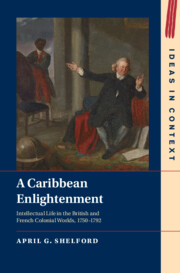Book contents
- A Caribbean Enlightenment
- Ideas in Context
- A Caribbean Enlightenment
- Copyright page
- Dedication
- Contents
- Figures
- Maps
- Tables
- Acknowledgments
- Note on the Text
- Abbreviations
- Chapter 1 What Is a Caribbean Enlightenment?
- Part I Before Breadfruit
- Part II Creating Enlightened Citizens
- Part III Tristram in the Tropics: or, Reading in Jamaica
- Part IV Cultivating Knowledge
- Introduction to Part IV
- Chapter 10 “Je sçais par une longue expérience”
- Chapter 11 Agricultural Enlightenment in the Saint-Domingue Press
- Chapter 12 The Enlightened Planter
- Conclusion to Part IV
- Chapter 13 Concluding Reflections
- Bibliography
- Index
Conclusion to Part IV
from Part IV - Cultivating Knowledge
Published online by Cambridge University Press: 14 September 2023
- A Caribbean Enlightenment
- Ideas in Context
- A Caribbean Enlightenment
- Copyright page
- Dedication
- Contents
- Figures
- Maps
- Tables
- Acknowledgments
- Note on the Text
- Abbreviations
- Chapter 1 What Is a Caribbean Enlightenment?
- Part I Before Breadfruit
- Part II Creating Enlightened Citizens
- Part III Tristram in the Tropics: or, Reading in Jamaica
- Part IV Cultivating Knowledge
- Introduction to Part IV
- Chapter 10 “Je sçais par une longue expérience”
- Chapter 11 Agricultural Enlightenment in the Saint-Domingue Press
- Chapter 12 The Enlightened Planter
- Conclusion to Part IV
- Chapter 13 Concluding Reflections
- Bibliography
- Index
Summary
The Conclusion to Part IV briefly summarizes the findings of the chapters on agricultural Enlightenment in the French Caribbean, characterizing it as, in James Livesey’s terms, a “knowledge culture.” It then underscores the absence of the enslaved’s expertise and knowledge in Caribbean agricultural literature. In the words of Beth Fowkes Tobin, these author-practitioners constructed two classes in their writings: “the managerial class—the planter and his agents—who possess knowledge about technology and labor and yet do not labor physically, and the laboring class—the slaves—who are described as having no knowledge of their own.” The enslaved also possessed considerable skill in cultivating their own food on provision grounds – indeed, their surpluses stocked colonial markets. But their horticultural knowledge went unmentioned. We can hardly be surprised, then, that Guisan and Poyen de Sainte-Marie obliged the planter to look to the enslaved’s happiness without requiring him to ask them in what that consisted.
Keywords
- Type
- Chapter
- Information
- A Caribbean EnlightenmentIntellectual Life in the British and French Colonial Worlds, 1750–1792, pp. 323 - 324Publisher: Cambridge University PressPrint publication year: 2023

